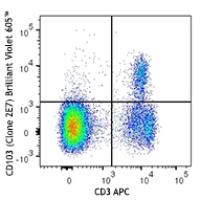-
Sign In
-

-
 Sony Biotechnology
Sony Biotechnology
-

-
 Sony Biotechnology
Sony Biotechnology
Brilliant Violet 605™ anti-mouse CD103
Antibodies Single
Sony
2E7
Flow Cytometry
Hamster IgG
Mouse
Mouse intestinal intraepithelial lymphocytes
50 µg
1207165
$301.00
Description
CD103 is a type I transmembrane glycoprotein known as αE integrin or Integrin αIEL chain. It belongs to the integrin family and is primarily found on intestinal intraepithelial lymphocytes (IEL). CD103 is also expressed on a subpopulation of lamina propria T cells, epithelial dendritic cells, lamina propria-derived dendritic cells, and a small subset of peripheral lymphocytes. T regulatory cells express high level of CD103. The CD103 expression on lymphocytes can be induced upon activation and TGF-β stimulation. In association with integrin β7, CD103 is expressed as αE/β7 heterodimer. Mature CD103 protein can be cleaved into 2 chains, a 150 kD (C-terminal) chain and a 25 kD (N-terminal) chain, which remain linked by disulfide bonds. CD103 binds to E-cadherin and mediates homing of lymphocytes to the intestinal epithelium.
Formulation
Phosphate-buffered solution, pH 7.2, containing 0.09% sodium azide and BSA (origin USA).Recommended Usage
Each lot of this antibody is quality control tested by immunofluorescent staining with flow cytometric analysis. For flow cytometric staining, the suggested use of this reagent is ≤0.5 microg per million cells in 100 microL volume. It is recommended that the reagent be titrated for optimal performance for each application.
Brilliant Violet 605™ excites at 405 nm and emits at 603 nm. The bandpass filter 610/20 nm is recommended for detection, although filter optimization may be required depending on other fluorophores used. Be sure to verify that your cytometer configuration and software setup are appropriate for detecting this channel. Refer to your instrument manual or manufacturer for support. Brilliant Violet 605™ is a trademark of Sirigen Group Ltd.
References
1. LeFrancois L, et. al, 1994. Eur. J. Immunol. 24:635. (FC, IHC, IP)
2. Mysorekar IU, et. al, 2002. J. Biol. Chem. 277:37811. (FC, IF)
3. Mikami N, et al. 2011. J. Immunol. 186:6886. PubMed
4. del Rio ML, et al. 2011. Transpl. Int. 24:501. (FC) PubMed
5. Quinn KM, et al. 2013. J. Immunol. 191:5085. PubMed
6. Verhagen J and Wraith DC. 2014. J. Immunol. Methods. S0022. (FC) PubMed
7. Xiao B, et al. 2015. PLoS One 1:e0115333. (IHC)


